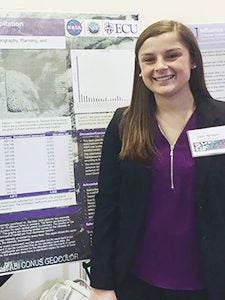Student Profile: Calie Hemgen

ECU undergraduate researcher Calie Hemgen is studying how geography affects local precipitation and climate change.
Major: Mathematics with a concentration in statistics
Mentor: Dr. Scott Curtis
Department: Department of Geography, Planning and Environment
Project Title: “Applying Data Science to a Dense Network of Precipitation Observation in Rural Jamaica: 2014-2015”
Calie’s project analyzes precipitation data collected across 15 different farms in southwestern Jamaica during a drought period from July 2014 to July 2015. The data was collected to investigate climate change, economic stress, and the role of water management in small island developing states (SIDS). The goal of her study is to document precipitation events for amount, intensity, duration, and timing to determine if any geographical characteristics affect precipitation delivered locally.
How did you get involved in undergraduate research?
I am in the Honors College, so I was doing practice interviews with some professors asking what it would be like if they were my mentor. One of my interviews was with Dr. Scott Curtis. He actually had some data that needed analyzing and asked if I would be able to help him with this research project.
Why did you choose your research topic?
I chose my research topic because I am interested in how climate change is affecting the world and what we can do to try and be resilient from it. My mentor is very passionate about helping small island developing states and it inspired me to be involved as well.
What’s been your favorite part of conducting undergraduate research?
My favorite part of conducting undergraduate research has been working with my mentor and seeing how what I’ve learned in the classroom can be applied to real world problems. Being a math major, we are constantly working with theoretical problems, but being able to actually do work that I know will make a difference is really inspiring.
What challenges have you faced while conducting undergraduate research?
One of the challenges I have faced while conducting research is studying something that has never been done before. I am having to come up with some of my own methods and ideas of how to best analyze the data that we have. I have been using past research about rainfall precipitation, but not all studies have collected data in the same way that we have.
Why is your research important for the general public?
Assessing precipitation that occurred within a drought period can help rural communities better manage their water, as they rely on rainfall for irrigation. Farmers in rural Jamaica are experiencing environmental change and market instability. We want to determine what role different water delivery systems have in enhancing small-scale agriculture resiliency in the face of uncertainty and change.
What’s your ultimate goal or accomplishment that you hope your research will help you achieve?
Our ultimate goal is to help farmers in rural Jamaica, but other small island developing states as well. Learning about precipitation in their area can help them learn how to best engineer their farms so that they are resilient to natural phenomena like a drought. If we can figure out what data helped us learn about the patterns in Jamaica, these same methods can be used in other SIDS.
Do you have any advice for other students interested in conducting undergraduate research?
My advice to other students interested in conducting undergraduate research is finding a mentor to work with first. If you know there is a certain field or subject you are interested in, then start meeting with professors in the same field. Most of the time, these professors already have a research project that they are working on and could use your help.
